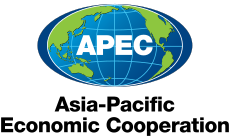
Back APEC Afrikaans Cooperación Economica d'Asia-Pacifico AN منتدى التعاون الاقتصادي لدول آسيا والمحيط الهادئ Arabic Foru de Cooperación Económica Asia-Pacíficu AST Asiya-Sakit Okean İqtisadi Əməkdaşlığı Azerbaijani Азия-Тымыҡ океан иҡтисади хеҙмәттәшлеге Bashkir Kooperasi Ékonomi Asia-Pasifik BAN Asia-Pacific Economic Cooperation BCL Азіяцка-Ціхаакіянскае эканамічнае супрацоўніцтва Byelorussian Азіяцка-Ціхаакіянскае эканамічнае супрацоўніцтва BE-X-OLD
Asia-Pacific Economic Cooperation | |
|---|---|
 Member economies of APEC | |
| Headquarters | |
| Type | Economic meeting |
| Membership | |
| Leaders | |
• Chairperson | |
• Executive Directors | |
| Establishment | 1989 |
Website www | |
Asia-Pacific Economic Cooperation (APEC /ˈeɪpɛk/ AY-pek[1]) is an inter-governmental forum for 21 member economies in the Pacific Rim that promotes free trade throughout the Asia-Pacific region.[2] Following the success of ASEAN's series of post-ministerial conferences launched in the mid-1980s,[3] APEC started in 1989,[4] in response to the growing interdependence of Asia-Pacific economies and the advent of regional trade blocs in other parts of the world; it aimed to establish new markets for agricultural products and raw materials beyond Europe.[5] Headquartered in Singapore,[6] APEC is recognized as one of the highest-level multilateral blocs and oldest forums in the Asia-Pacific region,[7] and exerts significant global influence.[8][9][10][11]
The heads of government of all APEC members except Taiwan (which is represented by a ministerial-level official as economic leader)[12] attend an annual APEC Economic Leaders' Meeting. The location of the meeting rotates annually among the member economies, and a famous tradition, followed for most (but not all) summits, involves the attending leaders dressing in a national costume of the host country. APEC has three official observers: the Association of Southeast Asian Nations Secretariat, the Pacific Economic Cooperation Council and the Pacific Islands Forum Secretariat.[13] APEC's Host Economy of the Year is considered to be invited in the first place for geographical representation to attend G20 meetings following G20 guidelines.[14][15]
Cite error: There are <ref group=lower-alpha> tags or {{efn}} templates on this page, but the references will not show without a {{reflist|group=lower-alpha}} template or {{notelist}} template (see the help page).
- ^ "What is APEC?". November 2018. Archived from the original on 11 December 2021. Retrieved 26 November 2020 – via YouTube.
- ^ "Member Economies". APEC. Archived from the original on 28 September 2018. Retrieved 16 January 2023.
- ^ Elek, Andrew (30 September 2005). "Back to Canberra: Founding APEC". PECC. Archived from the original on 18 September 2020. Retrieved 12 November 2017.
ASEAN's series of post-ministerial consultations,launched in the mid-1980s, had demonstrated the feasibility and value of regular consultations among ministerial-level representatives of both developed and developing economies.
- ^ "History". APEC. Archived from the original on 4 March 2019. Retrieved 18 September 2018.
The idea of APEC was firstly publicly broached by former prime minister of Australia Bob Hawke during a speech in Seoul, Korea, on 31 January 1989. Ten months later, 12 Asia-Pacific economies met in Canberra to establish APEC.
- ^ Elek, Andrew. "Back to Canberra: Founding APEC". Pacific Economic Cooperation Council. Archived from the original on 29 March 2016. Retrieved 18 September 2018.
- ^ "What is APEC and what can it do for business?" (PDF). National Center for APEC. Archived (PDF) from the original on 26 July 2011.
The APEC Secretariat is based in Singapore. The Secretariat is staffed by 20 diplomats seconded from APEC member economies and by 20 local staff.
- ^ Chu, Shulong (1 February 2017). "The East Asia Summit: Looking for an Identity". Brookings. Archived from the original on 25 September 2020. Retrieved 18 September 2018.
APEC (Asia-Pacific Economic Cooperation) is the oldest such forum and is generally recognized as the highest-level multilateral process in Asia-Pacific.
- ^ "Achievements and Benefits". apec.org. Archived from the original on 30 October 2020. Retrieved 18 September 2018.
- ^ "How Could The 2016 APEC Forum Affect The World Economy?". FXCM. 9 January 2017. Archived from the original on 16 September 2018.
The Asia-Pacific Economic Cooperation (APEC) forum represents a potentially large-scale trade area that, when functioning in a concerted manner, could in the future work to shift the axis of global manufacturing and trade away from the North Atlantic–European region toward the Pacific. [...] But the future of the bloc, which represents more than 50% of the world's GDP, may be in suspense.
- ^ Parreñas, Julius Caesar (January 1998). "ASEAN and Asia-Pacific economic cooperation". The Pacific Review. 11 (2): 233–248. doi:10.1080/09512749808719255.
- ^ What Context does the Asia-Pacific Economic Cooperation Forum (APEC)Provide for Employment Relations? (PDF) (Report). Archived (PDF) from the original on 20 August 2018.
APEC represents the most dynamic economic region in the world, having generated nearly 70 per cent of global economic growth in its first 10 years [...].
- ^ Conditions not right for APEC attendance: Ma Archived 17 November 2020 at the Wayback Machine. The China Post (27 August 2013). Retrieved 12 April 2014.
- ^ "Asia-Pacific Economic Cooperation -". apec.org. Archived from the original on 5 December 2020. Retrieved 12 November 2017.
- ^ "Invitees and International Organizations | G20 Foundation". Archived from the original on 21 February 2022. Retrieved 1 August 2020.
- ^ "Deputy PM meets US State Secretary on G20 meeting sidelines – Embassy of the Socialist Republic of Vietnam in the United States". vietnamembassy-usa.org. Archived from the original on 3 November 2017. Retrieved 12 November 2017.
